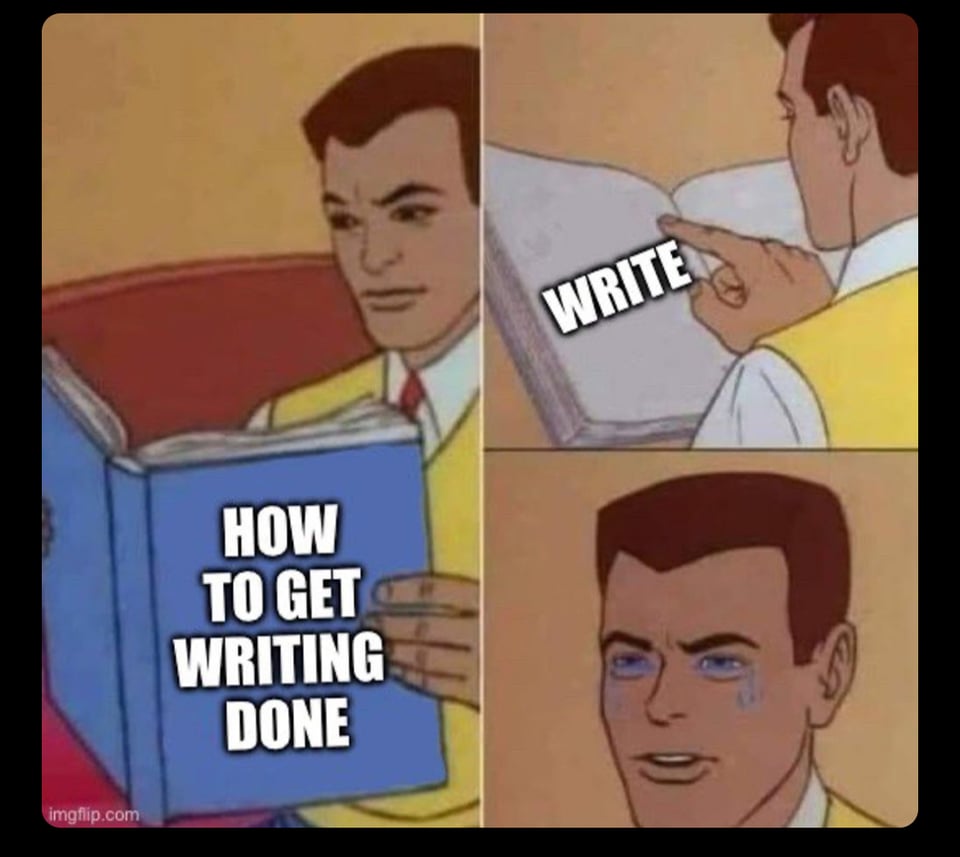Look 102: It's in your head
Fellow angler,
Now that I’ve sucked you in with a joke-filled first post, the joke is on you because I’m going to discuss actual writing.
A couple of months ago I finished the first draft of my first novel. One day I will tell you what it’s about, but today is not that day. I want to talk about something I learned from writing said draft.
To quote a longtime Yankees catcher (and brief Mets catcher and manager #LGM):
Baseball is 90% mental. The other half is physical.
-Yogi Berra1
Math aside, the same is true about writing.
Most of being a writer is convincing yourself to spend time and energy creating something that a small percentage of the population will maybe read one day and an even smaller percentage will enjoy. The rest is a physical practice.
In the beginning…
There is a well-documented fear of the blank page — the mental hurdle of figuring out how to create something from nothing. Film and media love to talk up this fear. As a millennial, I believe one of the best clips on it is from SpongeBob.
Starting gets a lot of attention but I say the biggest challenge comes after penning your first words.
The 90% that’s mental
Once you cross the starting line you need to do the harder and more ambiguous mental work showing up every day.
This is surely the stage where most wannabe writers fail. I’m guessing this is the script many follow:
Come up with an idea that excites you. Make a detailed outline or write a few chapters based on your idea. Look down one day and realize you don’t know what else to say. See you’ve only written 20,000 words. Decide writing a novel isn’t for you.2
If you want to make it to the end, you need to take a certain leap of faith. Or maybe it’s more a suspension of belief.
You need to commit to putting down words as they come, without looking too closely at them. Then the words will agree to keep coming from whichever other realm they normally reside. If you try to force it, you’re probably going to overthink and get stuck. It’s like those old Chinese finger traps. You have to pull the other way a bit to get the desired outcome.
From there, continuing to show up requires you to set aside your original conception of how the story would look. Endings, characters, clever lines — they all shift. The story itself will tell you when it’s reached a point where it feels finished.
Through it all, you need to learn, as writers often say, to kill your darlings. Not all poetic phrases or pages of detail will fit into the final story. Sometimes that’s because certain ideas no longer fit the vibe. Sometimes you cut for length. No matter how perfect your writing is, some of it will end up in the trash.
That long work of showing up every day to spend an hour doing something that you don’t fully understand to yield 10 minutes or less of usable work is a bitch. But as far as I know, it’s the only way to do it. And that’s true whether you write articles, essays, books, poems, or whatever else.

Perhaps the hardest part is accepting that you won’t fully understand how this whole process works. There are constant false starts and dead ends, but somewhere along the way you realize that you’ve made it where you were trying to go. It just looks different than you expected.
You also become much more comfortable with failure, which you likely redefined multiple times along the way. (Most of us are given a definition of failure from an outside source and I feel like it rarely serves us when we need it most.)
The physical half
Showing up isn’t all in your head. You need to turn that mental work into a physical practice.
For me, building and maintaining a routine that works took months to test and refine. I had to learn how to squeeze the rest of my life into a smaller window of time, sometimes sacrificing sleep and always giving up other things I would have liked to do.
I’m sure I’ll talk about writing routines more another day.
A summary of sorts
I once heard Kevin Hart say that a lot of people want to be stand-up comedians but no one wants to put in the work. I think the difficult middle bit of showing up every day is what he’s referring to.
Finding success requires the work of forcing yourself to show up over and over so you can navigate an amorphous process you’ll never fully understand. All for an undefined payout that’s far in the future. Honestly, who in their right mind wouldn’t give up?
The closest comparison I can make is getting yourself to go to the gym and work out regularly. Both activities have the same sort of I-know-logically-that-this-gets-me-something-I-want-to-have-in-the-future-but-it’s-painful-in-the-moment-and-maybe-I-should-do-something-more-fun-right-now quality.
Anyway, thanks for reading. It was more of a rant than I originally planned but hey, it’s 1am and we’re still finding our footing here. I didn’t even make a fishing pun 🤷.
Until next time,
Happy fishing!
Frank, if you’re reading this, thanks for giving me that Yogi Berra book 15 years ago. ↩
Here we confront the challenge that you don’t have a conception of word counts but writers usually track their writing by word count. There’s no 1:1 rule but 20,000 words is 80-ish pages of a book. If you wanted to write a book that’s 250 to 300 pages, you’d probably need somewhere between 60,000 and 80,000 words. At least, I think that’s right. This is a free blog and I’m not too concerned with fact-checking. If it helps anything, this post is 880 words long. ↩
Add a comment: